|
|
|
Sort Order |
|
|
|
Items / Page
|
|
|
|
|
|
|
| Srl | Item |
| 1 |
ID:
128405
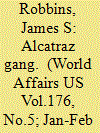

|
|
|
|
|
| Publication |
2014.
|
| Summary/Abstract |
Picture yourself locked "in a dimly lit, windowless concrete box, approximately nine feet long by four feet wide," with a bamboo mat and a bucket, one or both of your ankles locked in irons, left there like a caged animal. Now imagine spending two years there, alone-the isolation interrupted only by routine interrogation and occasional torture sessions, some lasting days-and you are getting close to describing the experiences of a handful of American prisoners of war whose North Vietnamese hosts had designated them as troublemakers. These were the men of Alcatraz. In all, more than three hundred and fifty American servicemen were being held captive by North Vietnam when US involvement ended in 1973. Few tales of American valor are as dramatic and gut-wrenching as those of the Vietnam-era POWs, some of whom were held for eight years, twice the length of US involvement in the Second World War. Defiant, by Alvin Townley, whose previous book chronicled the world of US Navy aviation, is the story of eleven of these captives whose leadership and resistance to their captors' treatment, including efforts to use them for propaganda purposes, caused the North Vietnamese so much trouble they were rounded up, blindfolded, and removed to a special prison they dubbed Alcatraz. They would spend two years there, isolated from the main group of American prisoners, segregated even from one another, forbidden to communicate amongst themselves, and tortured repeatedly for their refusal to capitulate. According to a camp functionary they nicknamed "Rabbit," the Alcatraz Eleven were the "darkest criminals who persist in inciting the other criminals to oppose the Camp Authority." We would call them heroes.
|
|
|
|
|
|
|
|
|
|
|
|
|
|
|
|
| 2 |
ID:
127311
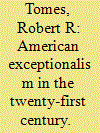

|
|
|
|
|
| Publication |
2014.
|
| Summary/Abstract |
Americans still believe their country is unique but are less convinced it has a special responsibility to lead. This has both domestic and international implications.
|
|
|
|
|
|
|
|
|
|
|
|
|
|
|
|
| 3 |
ID:
125384
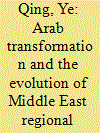

|
|
|
|
|
| Publication |
2013.
|
| Summary/Abstract |
Since its outbreak in the beginning of 2011, the Arab transformation that swept almost the whole middle east has now entered the third year with its geopolitical implications beginning to unfold gradually. When erupted in Tunisia and Egypt, it was driven primarily by internal dynamics and was regarded as a genuine local, bottom up movement in general. Much to people's surprise, incumbent regimes such as the Mubarak regimes in Egypt and Ben Ali regime in Tunisia that were once considered to be durable and formidable were too quick to be overthrown.
|
|
|
|
|
|
|
|
|
|
|
|
|
|
|
|
| 4 |
ID:
131343
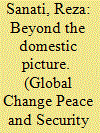

|
|
|
|
|
| Publication |
2014.
|
| Summary/Abstract |
This article examines the geopolitical determinants that have underpinned contemporary Iran-US relations, challenging the established thinking on why this relationship has been characterized by hostility. It is argued that the primacy that has been given to the role of domestic politics in either the US or Iran, as being the main arbiter of this relationship, is incomplete. This relationship is just as much a product of the structural conditions within the Middle East and the wider international system, which created the conditions for the clashing of the core national interests of both these states. However, due to the massive political and social alterations within the Middle East in the past decade, the notion of 'strategic irreconcilability' between both actors is now fundamentally changing. This has given room for a possible recalibration of the Iran-US relationship. Ultimately, it is argued that the synthesis of the domestic, the regional, and geopolitical levels of analysis are needed for a more holistic picture of the past, present, and future of Iran-US ties.
|
|
|
|
|
|
|
|
|
|
|
|
|
|
|
|
| 5 |
ID:
095423
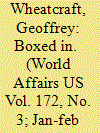

|
|
|
|
|
| Publication |
2010.
|
| Summary/Abstract |
In his keynote speech to the Republican convention, the chairman used most exalted words. After reviewing the record and achievements of the administration, he asked sonorously, "When have we rested more secure in friendship with all mankind?"
One of the tests English undergraduates have to endure is the "gobbet," an unidentified passage of literary or historical significance, whose date and author the examinee must guess. Maybe the arresting sentence just quoted will have stumped readers, but no one can possibly have dated that particular gobbet as 2008, or supposed that it was uttered by anyone at the last GOP convention in Minneapolis. John McCain and Sarah Palin, Lindsey Graham and Tom Ridge, could have said many other things. They might have boasted that the United States is the greatest nation on earth, or that it had never been more powerful, or that "We are winning," which is what Graham did say-but "friendship with all mankind"?
|
|
|
|
|
|
|
|
|
|
|
|
|
|
|
|
| 6 |
ID:
124578


|
|
|
|
|
| Publication |
2013.
|
| Summary/Abstract |
The debate around humanitarian intervention and the responsibility to protect generally concerns a collective action problem on the international level: motivating states to participate in a multilateral coalition to stop a mass atrocity. This debate presupposes that states enjoy a domestic consensus about their rights and responsibilities to intervene. This article reconsiders this assumption and examines the sources of domestic political will for intervention, particularly the role of partisanship, ideology, and public opinion on Congressional members' willingness to support US intervention for humanitarian purposes. We analyze several Congressional votes relevant to four episodes of US humanitarian intervention: Somalia, Haiti, Bosnia, and Kosovo. We find that public support for humanitarian intervention increases Congressional support and that other political demands, primarily partisanship and ideological distance from the president, often trump the normative exigencies of intervention. Our findings shed light on the domestic political dynamics behind humanitarian intervention and can help explain why some recent humanitarian missions have proceeded without seeking Congressional approval.
|
|
|
|
|
|
|
|
|
|
|
|
|
|
|
|
| 7 |
ID:
126739
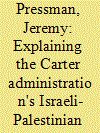

|
|
|
|
|
| Publication |
2013.
|
| Summary/Abstract |
This article challenges critics of the Camp David accords who acknowledge only limited accomplishments or contend the United States was covering for Israeli settlement expansion while seeking to thwart Palestinian self-determination. President Jimmy Carter and his administration sought to create a new pathway toward peace given the unwillingness of Israel's right-wing government under Menachem Begin to support Israeli withdrawal from the West Bank and Palestinian statehood. Carter officials saw the U.S. ideas as a middle way that might get the ball rolling and open a door to peace, however partial and however tentative the process might be at the beginning. Their best-case scenario was that the new U.S. approach would start to transform what the parties thought was possible with regard to the Palestinian question
|
|
|
|
|
|
|
|
|
|
|
|
|
|
|
|
| 8 |
ID:
126735
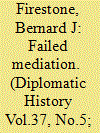

|
|
|
|
|
| Publication |
2013.
|
| Summary/Abstract |
U.N. Secretary General U. Thant (1961-1971), a vocal and persistent critic of the American war effort in Vietnam, attempted, with little success, to initiate negotiations to end the war. His efforts included public calls for negotiating formats that would include all the parties to the conflict, such as a reconvening of the Geneva Conference, and behind-the-scenes diplomacy to produce direct negotiations between the United States and North Vietnam. This article argues that Thant's failure to serve as a mediator had less to do with his own skills as a diplomat than they had to do with the Johnson administration's determination to achieve a military solution to the war. In this regard, the results of Thant's efforts were little different from those of other would-be mediators who also tried and failed to initiate negotiations.
|
|
|
|
|
|
|
|
|
|
|
|
|
|
|
|
| 9 |
ID:
128403
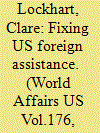

|
|
|
|
|
| Publication |
2014.
|
| Summary/Abstract |
In 2002, during the early stages of Afghanistan's reconstruction process, I sat in a remote part of Bamiyan Province with a group of villagers who told me how excited they had been several months before, when a $150 million housing program from a UN agency had been announced on the radio. They felt the program, which promised to bring shelter to their communities, would transform their lives. They were shocked, however, to discover soon after that this program had already come and gone-with very little change to their lives. Indignant, as well as curious, they decided to track the money and find out what had happened to the program that, as far as they were concerned, had never been. Becoming forensic accountants, they went over the files and figures and found that the original amount granted by the UN had first gone through an aid agency in Geneva that took twenty percent off the top before sub-contracting to a Washington-based agency that took another twenty percent. The funds were passed like a parcel from agency to agency, NGO to NGO, until they limped to their final destination-Afghanistan itself. The few remaining funds went to buy wood from Iran, shipped via a trucking cartel at above-market rates. Eventually some wooden beams did reach the village, but they were too heavy for the mud walls used in construction there. All the villagers said they could do was cut up the wood for firewood, sending $150 million literally up in smoke
|
|
|
|
|
|
|
|
|
|
|
|
|
|
|
|
| 10 |
ID:
131454
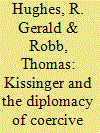

|
|
|
|
|
| Publication |
2013.
|
| Summary/Abstract |
The majority of scholarly accounts suggest that Anglo-Americans throughout the era of détente, 1969-1977, were often fraught with difficulties. In particular, the relationship between the Nixon administration and the British government of Edward Heath is often seen as the nadir for the Anglo-American relationship during the Cold War. Nonetheless, elements of the Anglo-American "special relationship," particularly those related to intelligence and nuclear co-operation, are often seen by scholars to have operated outside of these wider political difficulties. By utilising recently declassified documentation from both U.S. and UK archives, it is shown that both intelligence and nuclear co-operation were continually used by the United States as a means of convincing London to follow more amenable policy lines. With Henry Kissinger very much to the fore, it is illustrated how this coercive diplomacy had mixed results in achieving what Washington desired. Ultimately, this policy line would not accomplish what its main adherent, Henry Kissinger, sought.
|
|
|
|
|
|
|
|
|
|
|
|
|
|
|
|
| 11 |
ID:
130017
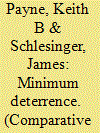

|
|
|
|
|
| Publication |
2014.
|
| Summary/Abstract |
Minimum Deterrence proposals claim that a relatively small number of nuclear weapons, measured in single digits to hundreds, is an adequate nuclear force for all pertinent U.S. deterrence missions, including extending U.S. nuclear deterrence coverage to U.S. allies. The vulnerability of an adversary's population and economy to nuclear weapons and the assumed high value of these targets to opposing leaders is the basis for the confident claims of Minimum Deterrence proponents that U.S. deterrence requirements can be met with a small number of nuclear weapons.
Contemporary proponents of Minimum Deterrence often argue that reducing to low nuclear force levels would:
1. provide deterrence that is more "stable" and greater safety than otherwise would be the case;
2. facilitate nuclear arms control agreements and successful non-proliferation policies;
3. provide substantial savings in the defense budget; and,
4. help create the conditions necessary for a more peaceful world order and help realize the goal of eliminating nuclear weapons entirely, i.e., "nuclear zero."
Recently, some U.S. officials and serving military officers have openly expressed support for the basic points and recommendations of Minimum Deterrence. Given the increased visibility of Minimum Deterrence and its potential to shape forthcoming U.S. policy decisions, it is important to identify the fundamental assumptions, logic and related conclusions of Minimum Deterrence proposals, and determine whether they are sound and consistent with available empirical evidence.
Minimum Deterrence claims generally are predicated on the following series of eight interrelated propositions:
v Deterrence will function reliably and predictably at low U.S. nuclear force numbers, now and in the future. U.S. conventional forces can substitute in many cases for nuclear forces to meet U.S. deterrence goals.
v Nuclear deterrence considerations no longer are pertinent to U.S. relations with Russia and China.
v Nuclear weapons are irrelevant to today's most pressing security threat-weapons of mass destruction (WMD) terrorism.
v Deterrence considerations alone determine the size and composition of the nuclear force requirements.
v Ballistic missile submarines (SSBNs) will remain invulnerable for 30 to 50 years. So, a small SSBN fleet can provide most or all of the nuclear capability needed for U.S. deterrence needs, now and in the future.
v The number of nuclear weapons and the risk of accidents and crises are directly correlated (more nuclear weapons means increased risk, while a decrease in their number reduces the risk).
v U.S. nuclear force reductions are essential to, and will strengthen, nonproliferation efforts; reductions also will facilitate further arms control progress. The Nuclear Non-Proliferation Treaty (NPT) requires U.S. movement toward nuclear disarmament.
v A small number of nuclear weapons is adequate for deterrence; thus U.S. defense spending can be reduced considerably by reducing nuclear forces.
Not all proposals for Minimum Deterrence include each of the eight elements. Several are of more recent vintage. But, a systematic examination reveals that these elements, implicitly or explicitly, are part of the contemporary Minimum Deterrence narrative.
The Obama administration's expressed policy positions undergirding its initiatives for nuclear reductions implicitly or explicitly reflect some, but not allof these eight Minimum Deterrence points. Particularly apparent in this regard is the presumed ability to predict with confidence and precision how deterrence and extended deterrence will work at much lower U.S. nuclear force levels.
Each of these eight points is described and critically examined here.
|
|
|
|
|
|
|
|
|
|
|
|
|
|
|
|
| 12 |
ID:
128136


|
|
|
|
|
| Publication |
2013.
|
| Summary/Abstract |
On November 26, 2011 Glenn Grenwald wrote an article in Salon magazine, a widely read American online publication, about a vast neoconservative plan to re-engineer the entire Middle East and North Africa region, in the aftermath of the collapse of the Soviet Union and the Warsaw pact in the early 1990s.
|
|
|
|
|
|
|
|
|
|
|
|
|
|
|
|
| 13 |
ID:
124785
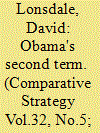

|
|
|
|
|
| Publication |
2013.
|
| Summary/Abstract |
President Obama's policy toward nuclear weapons has seriously undermined the flexibility and credibility of U.S. nuclear strategy. As a consequence of its desire to provide leadership on nuclear abolition, nuclear strategy under the Obama administration is shallow and unconvincing. This article seeks to put strategy back at the center of discourse on U.S. nuclear weapons policy. In this endeavor, and in contrast to Obama's stated stance, this article resurrects some important elements of Cold War strategic thinking on the subject. Warfighting, nuclear bargaining, and escalation dominance are particularly worthy of renewed attention.
|
|
|
|
|
|
|
|
|
|
|
|
|
|
|
|
| 14 |
ID:
127318
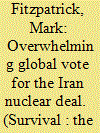

|
|
|
|
|
| Publication |
2014.
|
| Summary/Abstract |
One thing that is clear about the interim nuclear deal with Iran, reached on 24 November in Geneva, is that much of the world supports it. Nearly 70 nations have expressed that support formally. Nations liked that it capped Iran's programme, averted prospects for war, and showed light at the end of the sanctions tunnel. When members of the US Congress talk about legislating what a final deal with Iran must achieve, they ought to consider that the other parties to the negotiation also have a vote.
|
|
|
|
|
|
|
|
|
|
|
|
|
|
|
|
| 15 |
ID:
129105
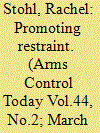

|
|
|
|
|
| Publication |
2014.
|
| Summary/Abstract |
On January 15, 2014, the United States released a document describing its new policy governing transfers of conventional weapons. The policy revision was long overdue, as the new publicly released document, Presidential Policy Directive 27 (PPD-27),[1] replaced a classified directive that came out in 1995.[2] The world has changed dramatically since the end of the Cold War. Until the release of the new policy document, however, the United States had been using policy guidance rooted in the geopolitical challenges created by the fall of the Soviet Union in making its arms transfer decisions and in outlining policy priorities and approaches to the global arms trade. According to a White House summary, a multi-year interval review of U.S. arms export policy "concluded that the 1995 conventional arms transfer policy was effective but needed to be updated to address 21st century national security and foreign policy objectives."[3] Thus, the new U.S. policy more accurately reflects the reality of U.S. arms transfers today. The Obama administration began its review when it came into office, but U.S. officials have said the impetus to finish the review came from events during the Arab Spring, when canisters of tear gas emblazoned with "Made in the USA" dominated pictures of the uprisings in Cairo's Tahrir Square. Questions surrounding U.S. arms sales to Egypt and other Arab countries led to increased scrutiny over the process of determining whether to transfer conventional arms and whether arms sales in fact led to U.S. influence over the recipient.
|
|
|
|
|
|
|
|
|
|
|
|
|
|
|
|
| 16 |
ID:
126758


|
|
|
|
|
| Publication |
2013.
|
| Summary/Abstract |
According to the honest broker model, when national security advisors press for specific policy outcomes, they compromise their ability to focus on improving the quality of the decision- making process. That model is tested here in the case of the 2006 Iraq Strategy Review. It found that national security advisor Stephen Hadley was able to act as honest broker, and that this did in fact improve the quality of the decision process. At the same time, he was able to act as a policy entrepreneur, connecting existing problems to alternative policy ideas. Consequently the two roles were not incompatible. Moreover, he was able to do both primarily because he acted as a credible agent of the president. The implication is that the national security advisor must be first and foremost an effective presidential agent, if he or she is to play any constructive role-including that of honest broker.
|
|
|
|
|
|
|
|
|
|
|
|
|
|
|
|
| 17 |
ID:
126491
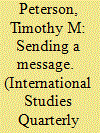

|
|
|
|
|
| Publication |
2013.
|
| Summary/Abstract |
Studies often assume that empty sanction threats inflict reputation costs on senders. However, target response to senders' previous decisions whether to back down or impose sanctions remains unexamined. In this paper, I argue that the target of sanction threats looks to the sender's actions against prior resistant targets. When the sender has backed down recently, the target, inferring that the sender is prone to making empty threats, is less likely to acquiesce. Conversely, when the sender has recently imposed sanctions against a resistant target, the current target infers that sanction imposition is likely to follow resistance, and therefore, it is more likely to acquiesce, all else equal. In statistical tests of US sanction threats spanning 1971-2000, I find strong evidence that the target is less likely to acquiesce when the United States recently backed down from a sanction threat. I find somewhat weaker evidence that the target is more likely to acquiesce when the United States recently imposed sanctions.
|
|
|
|
|
|
|
|
|
|
|
|
|
|
|
|
| 18 |
ID:
127313
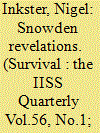

|
|
|
|
|
| Publication |
2014.
|
| Summary/Abstract |
The stream of revelations about US communications-intercept operations deriving from material purloined from the National Security Agency (NSA) by rogue contractor Edward Snowden has aroused strong emotions in a variety of constituencies. Civil-liberties groups concerned with issues of personal freedom and data privacy have expressed alarm about the pervasive nature of the NSA's bulk data collection. States that have been shown to have collaborated with the organisation in such collection have been embarrassed. And countries that considered themselves to have friendly relations with the United States but were the subject of its covert intelligence collection have reacted with varying degrees of outrage. Some of this outrage has been real, but much of it is manufactured for either domestic political reasons or in the hope of leveraging some policy advantage from the discomfiture of the US and its allies. The major US technology companies and service providers which have to varying degrees collaborated with the NSA, either voluntarily or in response to judicial warrants, have experienced a decline in customer trust, with uncertain but potentially significant implications for their future business prospects.
|
|
|
|
|
|
|
|
|
|
|
|
|
|
|
|
| 19 |
ID:
132076
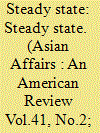

|
|
|
|
|
| Publication |
2014.
|
| Summary/Abstract |
Inherent to the United States' approach toward the Democratic People's Republic of Korea (DPRK) since the second North Korean nuclear issue emerged in the early fall of 2002 has been a policy predisposition that has coexisted with little tangible movement in the direction of resolving this very serious regional and global problem. Indeed, since its inception, overall this problem has become worse. That the DPRK has detonated three nuclear bombs hardly makes the security environment in Northeast Asia more stable, contrary to Pyongyang's claims that its nuclear deterrent force does just that, or brings the North Korean nuclear issue any closer to resolution. For sure, major missteps by Pyongyang have exacerbated the nuclear issue. Moreover, because the Bush and Obama administrations have maintained this predisposition embedded in U.S. ideology, which like any belief system, including the DPRK's juche (self reliance) idea, begets emotion accompanied by both self-deception and deception on the part of state officials, policies implemented by Washington in response to the North's perceived provocations have produced few successes. Policies built on faulty foundations, specifically those that exude the animus of the Cold War, are more likely to fail than not. This paper concludes by providing a practical solution to the North Korean nuclear issue, which should be attractive to both Washington and Pyongyang: a conditional peace treaty that rather quickly leads to the DPRK's denuclearization.
|
|
|
|
|
|
|
|
|
|
|
|
|
|
|
|
| 20 |
ID:
126719
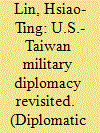

|
|
|
|
|
| Publication |
2013.
|
| Summary/Abstract |
This article seeks to retrace the making of the 1954 U.S.-Taiwan military alliance and shed new light on the Taiwanese perception of the issue. As will be revealed, the conclusion of the 1954 defense treaty between Washington and Taipei was not only a result of the American Cold War strategy in the Far East, as the numerous existing historical literature have admirably depicted. It was also a representation of Chiang Kai-shek's sophisticated military diplomacy, involving the role of a hitherto little-known group of Japanese then serving as his "unofficial" advisors. New historical evidence also suggests that, in this military diplomacy, Chiang played with the United States, for signing a defense pact was originally not one of his priorities. Rather, what Chiang had initially sought from America was the means by which to rearm his forces so as to strengthen his position to launch a military recovery of the mainland.
|
|
|
|
|
|
|
|
|
|
|
|
|
|
|
|
|
|
|
|
|